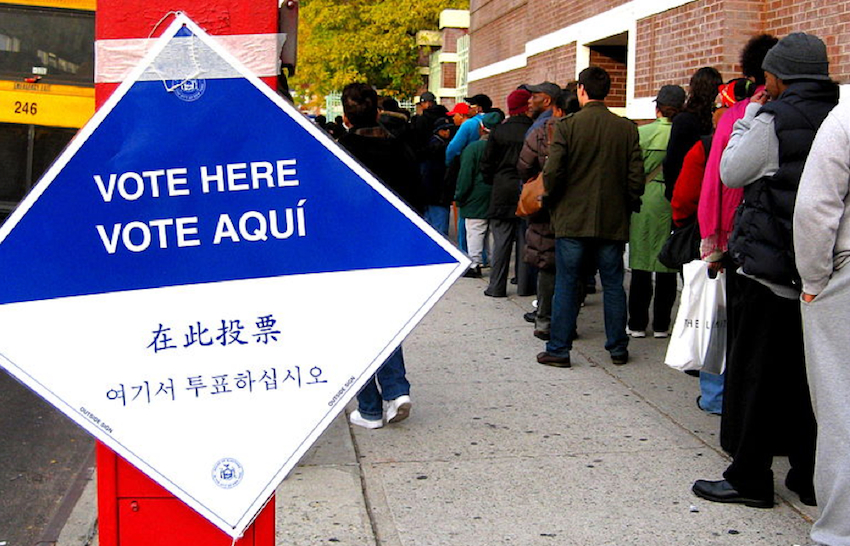
Allison Sikosrki
A line outside a voting site in Brooklyn in 2008.
I live in New York, which is seen as a bastion of liberalism, but conservative politicians in Albany are in control of our state Senate. If this continues, the Women’s Equality Agenda (WEA) will have no chance of becoming law. If New Yorkers don’t pay close attention to the candidates they’re voting for, our state could slide backward instead of pushing forward in how women are treated.
I’m a woman, a New Yorker and a feminist. If I died and were reincarnated a million times, I’d politely request to come back that way every time. However, being a woman in the 21st century has proven to be a complicated thing. On one hand, Brazil’s first female president is serving her second term, Angela Merkel is essentially the economic compass of Europe, and there’s a strong possibility that we’ll elect our first female president in 2016. Beyoncé, Jennifer Lawrence and Emma Watson have all publicly proclaimed themselves feminists.
At the same time, women like Anita Sarkeesian, Brianna Wu and Zoe Quinn are being violently threatened for speaking out against sexism in the gaming world. Still, in 2014, one-third of American women will experience rape, sexual violence, or stalking by an intimate partner. Two major Supreme Court decisions limiting access to birth control and safe abortions were decided this year, and legislative action to limit Roe v. Wade has been introduced in 17 states, according to the Guttmacher Institute. Nearly 300 girls are still missing from their families and communities in Nigeria. And in New York, the WEA has failed to pass twice.
While we have strong feminist political idols and pop icons, it’s impossible to ignore the fact that the voices and experiences of women in New York and around the world are being silenced.
That’s why I vote. It’s also why I volunteer at Planned Parenthood of New York City (PPNYC). I volunteer as a clinic escort, ensuring that patients can access PPNYC’s health centers safely. I also work with Planned Parenthood of New York City Action Fund’s Political Action Group, or PAG. If someone calls you from PPNYC Action Fund asking if you’ll support a pro-reproductive health candidate or knocks on your door with information about reproductive health issues in local elections, it’s me or a fellow PAG-er.
We really are sorry for interrupting your dinner. But we’re spending our evenings calling your house because we want a better world for our mothers, daughters, sisters and ourselves. Because our friends are harassed on the way to the health center to pick up birth control. Because women in California prisons were sterilized against their will as late as 2010. Because Colorado, North Dakota and Tennessee have personhood amendments on the ballot that could restrict many forms of birth control, abortion and in vitro fertilization. Because Missouri has only one health center left that provides abortion. And because essential protections like those in the WEA still fail to be passed in my state.
The WEA would enshrine equal pay for equal work, end sexual harassment on the job, seek to end work and housing discrimination against victims of domestic violence, and align New York’s abortion protections with those found in Roe v. Wade, among other important issues. This progressive plan would protect women’s safety and rights, particularly the rights of some of the most vulnerable women—namely, low-income women and victims of domestic violence (two populations that often overlap).
I want women to have more opportunities and better lives. I want New York to be an example for other states, proof that trusting women, listening to their needs, and eliminating barriers to their health, safety, and livelihood pays off in a stronger economy, better health outcomes, and a more humane political climate.
I vote because I believe my voice matters. I volunteer because poor women, undocumented immigrants, young people, people who are incarcerated, and many, many more don’t have a voice. But they deserve more choices, not fewer. I believe we all deserve more. I believe we all deserve better. And when I catch you just as you’re sitting down to dinner, or leave you a voicemail about local elections, I’m asking you to believe, too.







